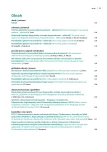-
Medical journals
- Career
Mild hypoglycaemia is common in type 2 diabetic patients treated with insulin analogues in the Czech Republic and the patients are concerned about it: results of a GAPP2TM survey (Global Attitudes of Physicians and Patient)
Authors: Martin Prázný
Authors‘ workplace: III. interní klinika 1. LF UK a VFN, Praha, přednosta prof. MUDr. Štěpán Svačina, DrSc., MBA
Published in: Vnitř Lék 2015; 61(3): 267-273
Category: Actualities
Overview
Objective:
Mild hypoglycaemia affects diabetes management, productivity and quality of life of patients. Data are scarce about the incidence of mild hypoglycaemia in daily life of type 2 diabetic patients treated with insulin analogues. The aim was to focus on the incidence of mild hypoglycaemia and its consequences in the international GAPP2™ survey (Global Attitudes of Patient and Physicians) conducted also in the Czech Republic.Methods:
The GAPP2 ™ project – Global Attitudes of Patients and Physicians is an international cross-sectional study conducted online via Internet in a questionnaire form dedicated to type 2 diabetic patients treated with insulin analogues and physicians who treat these patients. The survey was realized in two steps including 17 countries. The first step was completed by six countries in 2012. The second step was terminated by additional eleven countries including the Czech Republic in 2014. The survey was designed to obtain data on some aspects of insulin therapy and persistent issues in daily practice from the views of patients and physicians. One part of survey was dedicated to mild hypoglycaemia occurring in treatment with insulin analogues. The incidence of mild hypoglycaemia and the reaction of patients and physicians on hypoglycaemia (including modification of therapy, self-monitoring) were investigated. Moreover, there was investigated the impact of mild hypoglycaemia on quality of life from the view of patients and physicians.Results:
The results of the survey have shown that mild hypoglycaemia is common in patients with insulin analogues in the Czech Republic. In addition, patients in the Czech Republic are more afraid from hypoglycaemia and feel more limited in daily life in comparison to other countries in GAPP2 ™ survey. Patients try to avoid nocturnal hypoglycaemia through reduction or omission of prescribed dose of insulin. Furthermore, research has observed that physicians are poorly informed by patients about incidence and severity of hypoglycaemia.Conclusion:
The incidence of mild hypoglycaemia is in the Czech Republic as common as in other countries involved in the GAPP2 ™ survey. However, the Czech patients are more afraid and this fact is often hidden before physicians. Increased fear of hypoglycaemia suggests inadequate education in terms of how to avoid and manage hypoglycaemia. Particular emphasis should be placed on nocturnal hypoglycaemia. Physicians should discuss more with patients about issue of hypoglycaemia. It is important to motivate patients to share the information with physicians about incidence and severity of hypoglycaemia.Key words:
adherence – basal insulin – hypoglycaemia – insulin omission – insulin therapy – type 2 diabetes mellitus
Sources
1. IDF. The Global Burden. Dostupné z WWW: <http://www.idf.org/diabetesatlas/5e/the-global-burden>.
2. UZIS. Dostupné z WWW: <http://www.uzis.cz>.
3. WDF. Diabetes Facts. Dostupné z WWW: <http://www.worlddiabetesfoundation.org/composite-35.htm>.
4. Brod M, Rana A, Barnett AH. Impact of self-treated hypoglycaemia in type 2 diabetes: a multinational survey in patients and physicians. Curr Med Res Opin 2012; 28 (12): 1947–1958.
Labels
Diabetology Endocrinology Internal medicine
Article was published inInternal Medicine

2015 Issue 3-
All articles in this issue
- Non-celiac gluten sensitivity
- Non-celiac gluten sensitivity
- Our experience with hormonal therapy in transsexual patients
- Does body height affect the severity of chronic venous disease in lower extremities?
- Experiences with biosimilar drugs in therapy
- The most recent aspects of diagnosis and therapy of hyponatraemia
- Non-celiac gluten sensitivity
- Chronic thromboembolic pulmonary hypertension
- New ESC guidelines on the diagnosis and management of acute pulmonary embolism
-
Pelvic venous congestion syndrome – diagnosis and management.
Guidelines of the Angiology Section of Slovak Medical Chamber (2015) -
PET-CT dokumentovaná remise multicentrické formy Castlemanovy choroby po léčbě rituximabem
Popis případu a přehled literatury - Hypersensitive reaction after application of heparin with activation heparin induced trombocytopenia in initiation of intermittent haemodialysis
- Selected legal aspects of compulsory confidentiality
- Mild hypoglycaemia is common in type 2 diabetic patients treated with insulin analogues in the Czech Republic and the patients are concerned about it: results of a GAPP2TM survey (Global Attitudes of Physicians and Patient)
- Hormonal therapy in transsexual patients – editorial
- The most recent aspects of diagnosis and therapy of hyponatraemia – editorial
- Internal Medicine
- Journal archive
- Current issue
- Online only
- About the journal
Most read in this issue- Our experience with hormonal therapy in transsexual patients
-
Pelvic venous congestion syndrome – diagnosis and management.
Guidelines of the Angiology Section of Slovak Medical Chamber (2015) - Non-celiac gluten sensitivity
- The most recent aspects of diagnosis and therapy of hyponatraemia
Login#ADS_BOTTOM_SCRIPTS#Forgotten passwordEnter the email address that you registered with. We will send you instructions on how to set a new password.
- Career

